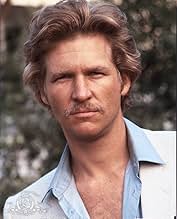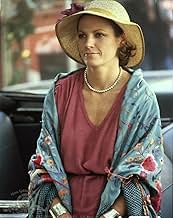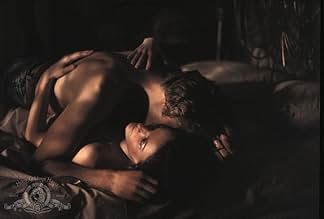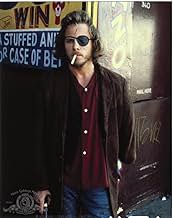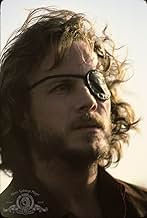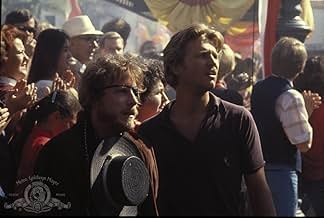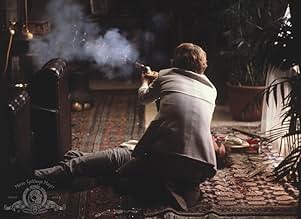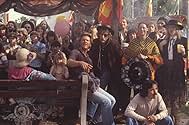CALIFICACIÓN DE IMDb
6.8/10
8.3 k
TU CALIFICACIÓN
Richard ve a un hombre deshaciéndose de un cuerpo y decide, con su amigo Alex Cutter, exponer al que él cree es el culpable.Richard ve a un hombre deshaciéndose de un cuerpo y decide, con su amigo Alex Cutter, exponer al que él cree es el culpable.Richard ve a un hombre deshaciéndose de un cuerpo y decide, con su amigo Alex Cutter, exponer al que él cree es el culpable.
- Dirección
- Guionistas
- Elenco
- Premios
- 2 premios ganados y 2 nominaciones en total
Francis X. McCarthy
- Toyota Man
- (as Frank McCarthy)
- Dirección
- Guionistas
- Todo el elenco y el equipo
- Producción, taquilla y más en IMDbPro
Opiniones destacadas
This is an excellent movie and one of the most consistently underrated. John Heard has never been better, and he is (alongside the late J.T. Walsh) amongst the most under-appreciated actors ever (one of the few mistakes in 'The Sopranos' was to let him go). However, Jeff Bridges yet again proves his credentials by turning in a beautifully nuanced performance as an unattractive, self-absorbed failed playboy in counterpoint to Heard's righteous crippled Vietnam veteran.
This is a companion piece to 'Chinatown' in its study of corrupt power structures, but is more intimate and believable (and 'Chinatown' is superb). We still wait for its recent equal in the noir stakes.
This is a companion piece to 'Chinatown' in its study of corrupt power structures, but is more intimate and believable (and 'Chinatown' is superb). We still wait for its recent equal in the noir stakes.
Ostensibly this film appears to be a buddy movie from the 1980s, but it is actually something much more interesting. Employing standard Hollywood clinches with its thriller/ investigation narrative and many of of its "stock" characters and situations, the little guys - Heard and Bridges - take on Mr Fat Cat Capitalist who rules the peacetime world like an untouchable and corrupt monarch. The film, though well-executed and enjoyable, at first seems no more than a well-scripted, well-acted (Heard is particularly good as the embittered, crippled Vietnam Veteran) genre piece. However, what emerges by the end is something far more exciting and radical - an indictment of US politics and power relations, and a genuinely bleak reflection on the impossibility and rarity of real justice both at the micro and macro levels.
Vietnam and its true significance is used to great effect in the film, as is the interplay between the two buddies. Whilst Bridges won't accept that he has witnessed the ultimate, bleak truth of US power relations until the film's abrupt, punchy end, Heard knows the truth intuitively and automatically because he understands and hates the world from the the start. He has given up on notions such as forgiveness and even the need for legal process, and seeks only revenge on the rich and the powerful. He understands, correctly, that is the only way a kind of momentary justice is possible, since everything else is either controlled by the elites or made to protect them. Without wishing to spoil the film's brilliant final moments, it is here that the whodunnit story is stripped away and the guilt they have been seeking to prove, as Richard Bone realises, becomes entirely political or metaphysical, and the the crime itself becomes irrelevant.
Vietnam and its true significance is used to great effect in the film, as is the interplay between the two buddies. Whilst Bridges won't accept that he has witnessed the ultimate, bleak truth of US power relations until the film's abrupt, punchy end, Heard knows the truth intuitively and automatically because he understands and hates the world from the the start. He has given up on notions such as forgiveness and even the need for legal process, and seeks only revenge on the rich and the powerful. He understands, correctly, that is the only way a kind of momentary justice is possible, since everything else is either controlled by the elites or made to protect them. Without wishing to spoil the film's brilliant final moments, it is here that the whodunnit story is stripped away and the guilt they have been seeking to prove, as Richard Bone realises, becomes entirely political or metaphysical, and the the crime itself becomes irrelevant.
I stumbled upon this movie at the Nickelodeon on Cape Cod the year of its release...at a time when VCR's and DVD's weren't a part of our culture...when you had to travel to obscure and far-out theaters to see obscure and far-out films during the fading window of opportunity offered as its limited run at the movie house. What a gem. I was instantly riveted by the story and the classic performances that brought it to life. The pathetic human condition personified in Cutter, Bone, and Mo is so exquisitely rendered as to be tragic...only salvaged by the clear-eyed wit and insight of John Heard's Cutter and the tempered and logical cynicism and indifference offered up by Bone(Jeff Bridges)as the balance that only these begrudging friends could provide each other. Lisa Eichorn's character(Mo) exhibits equal measures of the qualities both her male couterparts have and her subtle performance points up the conflict she feels in simultaneously rejecting and craving their opposing energies. The scene where she chews them both out for their selfish and naive plot and their spirited responses seems to spill from their beings as genuine emotion...not written dialogue...and it still sends chills through me...very powerful...and the scene where she is made painfully aware of Bone's incurable drive to bed women as she falls prey to his momentary sympathies ..when coupled with her husband's(Cutter) inability to give a soft refuge to her is so tragically realistic...tears flow. Everyone's shortcoming's cross-up everyone else's and as the surrealistic climax develops its symbolism and power are Shakespearian. This movie works as a crime thriller, a portrait of the underbelly of American culture most evidenced in its loss of confidence and embrace of cynicism that came to the surface post-Vietnam...but most successfully as a great character-driven love story and tragedy.
The title "Cutter's Way" is a reference to the main character, Alexander Cutter, perhaps cinema's all-time best antihero. John Heard plays the difficult role of an angry Vietnam veteran who returned from what he now regards as a meaningless war minus an arm, an eye, and a leg. He hates the fat cats-feeling that they conned him and others into patriotically serving while they stayed home, and he resents his best friend Richard Bone (Jeff Bridges) who avoided the war and continues to avoid any involvement or commitment. Commitment is Alexander Cutter's one remaining virtue, when he sets his sights on taking down an arrogant oil tycoon who has gotten away with murdering a 17 year old cheerleader, he stubbornly refuses to give up this mission and insists on doing it his way.
Heard should have gotten the Best Actor Oscar in 1981 (it went to Henry Fonda for "On Golden Pond") but "Cutter's Way" was not popular with critics and viewers so Heard was not even nominated. It is an amazing performance as Heard must win audience sympathy for a character who is not only unpleasant, but terribly abusive to everyone- especially his wife and his only two remaining friends. But he earns our admiration with his final act as a knight (on a white horse) who gallops into danger to avenge his wife's murder.
With this Cutter is finally revealed as a romantic who is willing to back up his angry words and seemingly empty threats. His anger is over more than his wasted wartime sacrifice. He feels frustration and confusion because while he has remained the same, the world has changed around him in ways antithetical to his beliefs (can you identify with that?). He recognizes that he has become irrelevant to this world but is not going out until he has made a last stand. His commitment ultimately gets Bone to take his first moral stand and finish what his friend started, doing it "Cutter's Way".
Like "Fat City" (another of Jeff Bridges' early films) "Cutter's Way" is more appreciated now than at the time of its release. In part this is because both of these films have held up very well, if anything their political messages are even more relevant today. Thematically "Cutter's Way" is a political film-both anti-war and anti-power; very much in the tradition of "Chinatown" and the world of Raymond Chandler adaptations.
This film is essentially a character study with an expressionistic ending. Most action/adventure fans will find it way too slow and cerebral for their tastes. The acting and the themes are its strength, the contrived story is a non-fatal flaw. The multi-dimensionality of Cutter, Bone, and Cutter's wife Mo (an extraordinary performance by Lisa Eichhorn) are carefully crafted and revealed by director Ivan Passer. Cutter's other remaining friend George (Arthur Rosenberg) is equally well crafted but more secondary to the story.
A fifth character (the dead cheerleader's older sister played by Ann Dusenberry) appears to be a victim of the post-production process as she simply disappears without explanation about 20 minutes before the film's end. Normally the absence of a supporting character would go unnoticed but Dusenberry had done such a nice job developing this character (maximizing what little she was given to work with) that the absence is glaring. Contemporary audiences will see a lot of Dominique Swain in Dusenberry. They not only look enough alike to be sisters but they have the same confident flare to their acting style. Passer had to work hard to keep Dusenberry reined in but succeeded in getting a nice restrained performance from her, her high intensity peeks through just enough to convey that there is more to her character than meets the eye.
Then again, what do I know? I'm only a child.
Heard should have gotten the Best Actor Oscar in 1981 (it went to Henry Fonda for "On Golden Pond") but "Cutter's Way" was not popular with critics and viewers so Heard was not even nominated. It is an amazing performance as Heard must win audience sympathy for a character who is not only unpleasant, but terribly abusive to everyone- especially his wife and his only two remaining friends. But he earns our admiration with his final act as a knight (on a white horse) who gallops into danger to avenge his wife's murder.
With this Cutter is finally revealed as a romantic who is willing to back up his angry words and seemingly empty threats. His anger is over more than his wasted wartime sacrifice. He feels frustration and confusion because while he has remained the same, the world has changed around him in ways antithetical to his beliefs (can you identify with that?). He recognizes that he has become irrelevant to this world but is not going out until he has made a last stand. His commitment ultimately gets Bone to take his first moral stand and finish what his friend started, doing it "Cutter's Way".
Like "Fat City" (another of Jeff Bridges' early films) "Cutter's Way" is more appreciated now than at the time of its release. In part this is because both of these films have held up very well, if anything their political messages are even more relevant today. Thematically "Cutter's Way" is a political film-both anti-war and anti-power; very much in the tradition of "Chinatown" and the world of Raymond Chandler adaptations.
This film is essentially a character study with an expressionistic ending. Most action/adventure fans will find it way too slow and cerebral for their tastes. The acting and the themes are its strength, the contrived story is a non-fatal flaw. The multi-dimensionality of Cutter, Bone, and Cutter's wife Mo (an extraordinary performance by Lisa Eichhorn) are carefully crafted and revealed by director Ivan Passer. Cutter's other remaining friend George (Arthur Rosenberg) is equally well crafted but more secondary to the story.
A fifth character (the dead cheerleader's older sister played by Ann Dusenberry) appears to be a victim of the post-production process as she simply disappears without explanation about 20 minutes before the film's end. Normally the absence of a supporting character would go unnoticed but Dusenberry had done such a nice job developing this character (maximizing what little she was given to work with) that the absence is glaring. Contemporary audiences will see a lot of Dominique Swain in Dusenberry. They not only look enough alike to be sisters but they have the same confident flare to their acting style. Passer had to work hard to keep Dusenberry reined in but succeeded in getting a nice restrained performance from her, her high intensity peeks through just enough to convey that there is more to her character than meets the eye.
Then again, what do I know? I'm only a child.
Cutter's Way cannot be overpraised. This movie is a masterpiece of the first order. Ivan Passer, a compatriot of Milos Forman, came to the USA as an experienced Czech movie director. Not unlike Alfred Hitchcock or some German directors 30 years before him, he seems to have made a thorough analysis of the American social conditions and general manners. He then transformed his findings into movies. Two of them I know deal with New York. They are appropriately gritty. The setting of Cutter's way is a Californian beach community for the rich and beautiful and the movie is appropriately glossy. The whole story takes place in those paradisiac locales. They are presented like an enchanted kingdom, a country of its own.
Under the glossy surface, there is a darker side to the place. There is prostitution, drug abuse and murder. Cutter, living on the fringes of the enchanted kingdom, sees that more clearly than everyone else. He has his own code of chivalry by which he wants to live. He develops conspirational theories and strains to convert them into hard facts. The world around him, populated by indifferent, amoral rich and beautiful people, does not understand him, does not even want to listen, laughs at him. So Cutter mounts a white stallion and rides a charge.
Repeatedly the film slips into surrealistic situations, in which the impression made on the viewers is more relevant than the storyline. This technique was well known in the forties (e.g. in film noir), present day audience are less used to it. In the earlier days of film making, surrealism was created on a soundstage, and the change between reality and "dream" became immediately clear. Passer uses real locations for situations removed from reality a daring experiment that rewards the viewers with hauntingly beautiful pictures but might also confuse many. The director took this risk and we are rewarded with a magnificent picture about a distinguished slice of America. I predict: Cutters way will one day become an honored classic.
Under the glossy surface, there is a darker side to the place. There is prostitution, drug abuse and murder. Cutter, living on the fringes of the enchanted kingdom, sees that more clearly than everyone else. He has his own code of chivalry by which he wants to live. He develops conspirational theories and strains to convert them into hard facts. The world around him, populated by indifferent, amoral rich and beautiful people, does not understand him, does not even want to listen, laughs at him. So Cutter mounts a white stallion and rides a charge.
Repeatedly the film slips into surrealistic situations, in which the impression made on the viewers is more relevant than the storyline. This technique was well known in the forties (e.g. in film noir), present day audience are less used to it. In the earlier days of film making, surrealism was created on a soundstage, and the change between reality and "dream" became immediately clear. Passer uses real locations for situations removed from reality a daring experiment that rewards the viewers with hauntingly beautiful pictures but might also confuse many. The director took this risk and we are rewarded with a magnificent picture about a distinguished slice of America. I predict: Cutters way will one day become an honored classic.
¿Sabías que…?
- TriviaBefore production started on this film, Ivan Passer and producer Paul R. Gurian went to Jeff Bridges' house to ask him if he would agree to play Bone. After both entered Bridges' property, the actor's dog, a big German shepherd, attacked Gurian, biting him on the jaw. Gurian nearly died. Bridges later confessed that, after this incident, he had no choice but to accept the role in order to avoid being sued for several million dollars.
- ErroresValerie's disappearance is neither explained nor noted by the main characters.
- Citas
Alex Cutter: I don't drink. You know, the routine grind drives me to drink. Tragedy, I take straight.
Selecciones populares
Inicia sesión para calificar y agrega a la lista de videos para obtener recomendaciones personalizadas
- How long is Cutter's Way?Con tecnología de Alexa
Detalles
- Fecha de lanzamiento
- País de origen
- Idiomas
- También se conoce como
- Cutter and Bone
- Locaciones de filmación
- 800 Alvarado Place, Santa Bárbara, California, Estados Unidos(El Encanto Hotel scenes.)
- Productora
- Ver más créditos de la compañía en IMDbPro
Taquilla
- Presupuesto
- USD 3,000,000 (estimado)
- Total en EE. UU. y Canadá
- USD 1,729,274
- Total a nivel mundial
- USD 1,752,634
Contribuir a esta página
Sugiere una edición o agrega el contenido que falta


